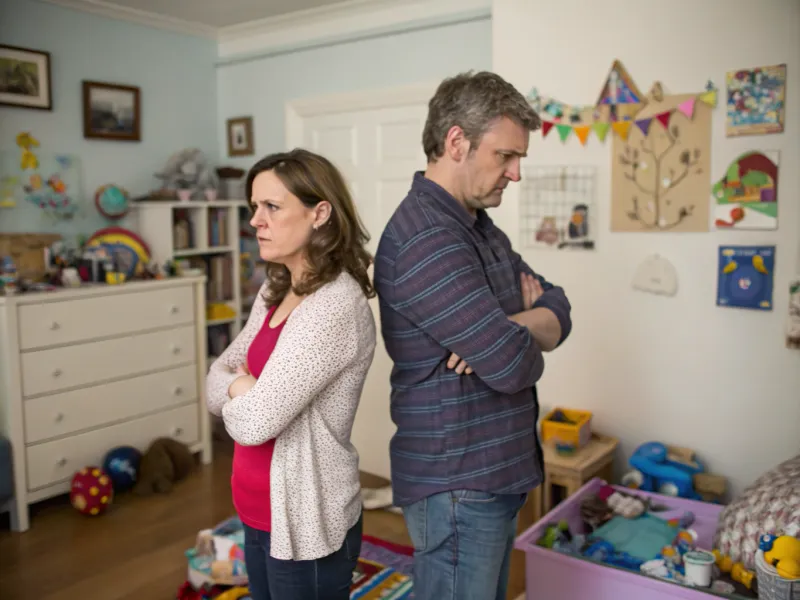34 Subtle Yet Powerful Reasons Marriages Fall Apart
Marriage is often perceived as a journey filled with joy and companionship, yet it can unravel in ways we might never expect. In today’s world, relationships face challenges that can quietly grow into insurmountable obstacles.
By exploring a myriad of reasons marriages may fail, we begin to understand the complexity and fragility inherent in love.
Each of these 34 causes tells its own story, reflecting the diverse struggles couples face. Join me as we unravel these tales, not to diminish the sanctity of marriage but to appreciate the deep connections and challenges that define our human experience.
1. Communication Breakdown

In any relationship, communication acts as the cornerstone, holding everything else together. When words falter, misunderstandings take root, leading to an emotional chasm that can become increasingly difficult to bridge. You might find yourself talking, yet not truly listening or being heard, creating a space where assumptions and misinterpretations thrive.
Imagine a simple conversation turning into a labyrinth of confusion because neither party is fully engaging or showing empathy. This lack of clear communication can lead to feelings of isolation and frustration, gradually eroding the bond that once seemed unbreakable.
Addressing communication issues requires more than just words; it demands patience, understanding, and the willingness to see beyond one’s own perspective. By fostering an environment where both partners feel valued and understood, you can rebuild the bridges that once seemed lost.
2. Financial Stress

Money is often seen as a practical concern, yet its impact on relationships can be profound. Financial stress can act like a silent intruder, creeping into the corners of your marriage and casting shadows over even the happiest moments.
When financial concerns dominate your conversations, they can create tension and resentment. The pressure to meet financial obligations might lead you to blame each other, rather than working together to find solutions.
In navigating financial stress, it’s crucial to maintain open dialogue and a shared sense of responsibility. By understanding each other’s financial habits and creating a plan that aligns with both partners’ goals, you can turn a potential source of conflict into an opportunity for growth and unity.
3. Infidelity

Infidelity often feels like a betrayal that strikes at the very core of a relationship. It’s not just about the physical act but the breach of trust and emotional connection that can leave lasting scars.
When one partner strays, it can shake the foundation of the marriage, creating a ripple effect that touches every aspect of life. The emotional turmoil and feelings of inadequacy can be overwhelming, making reconciliation a challenging process.
Healing from infidelity requires time, honesty, and a deep commitment to understanding the underlying issues. Only through open conversations and genuine efforts to rebuild trust can a couple move forward, learning from the past while forging a new path together.
4. Lack of Intimacy

Intimacy goes beyond physical connection; it’s about the emotional warmth that binds two people together. When intimacy begins to wane, the relationship can feel cold and distant, leaving both partners longing for the connection they once had.
Without regular expressions of love and affection, a marriage can become a mere coexistence, lacking the depth and passion that once flourished. The absence of intimacy might lead you to feel unappreciated and disconnected, feeding into a cycle of neglect and isolation.
Reviving intimacy requires intentional effort and understanding, embracing both emotional and physical expressions of love. By recognizing each other’s needs and creating moments of genuine connection, you can breathe new life into the relationship, rekindling the flame that first brought you together.
5. Growing Apart

Over time, people change, and sometimes those changes lead couples on divergent paths. Growing apart is a gradual process, often unnoticed until the gap becomes too wide to ignore.
It’s not about one dramatic event but a series of small shifts that accumulate over time. You might find that shared interests and values begin to diverge, leading to a sense of estrangement.
Recognizing this drift early can be the key to reconnecting. By actively engaging in each other’s lives and celebrating both shared and individual growth, you can maintain a sense of unity even as you evolve. Embracing change together ensures that your paths remain intertwined, rather than drifting into separate journeys.
6. Unresolved Trauma

Trauma from the past can cast long shadows over the present, influencing the dynamics of marriage in subtle yet profound ways. Unresolved trauma can manifest as emotional barriers, preventing genuine connection and understanding.
You may find yourself reacting to your partner in ways that are deeply rooted in past experiences, leading to confusion and conflict. These reactions can create a cycle where both partners feel misunderstood and alienated.
Addressing unresolved trauma requires courage and compassion, both for yourself and your partner. By seeking professional support and fostering open communication, you can begin to heal old wounds and build a relationship grounded in empathy and mutual respect.
7. Constant Fighting

While disagreements are natural in any relationship, constant fighting can erode the very fabric of a marriage. When every conversation turns into a confrontation, the home becomes a battleground rather than a sanctuary.
Frequent arguments can stem from deeper issues, manifesting as irritability and dissatisfaction. Over time, this relentless conflict can lead to emotional exhaustion, leaving both partners feeling defeated and disconnected.
Breaking the cycle of constant fighting requires introspection and a willingness to change. By identifying underlying triggers and fostering a culture of patience and compromise, you can transform conflicts into opportunities for growth and understanding, turning arguments into dialogues that strengthen your bond.
8. Unmet Emotional Needs

Emotional needs are the invisible threads that weave the fabric of a marriage. When those needs go unmet, they can create a lingering sense of emptiness and disconnection.
You might find yourself yearning for recognition, affection, or empathy, yet unable to communicate these desires effectively. This silent longing can lead to resentment and a gradual withdrawal from the relationship.
Understanding and meeting emotional needs requires active listening and empathy. By creating a space where both partners feel seen and valued, you can nurture a connection that fulfills these essential needs, fostering a marriage that thrives on mutual support and understanding.
9. Unrealistic Expectations

Entering marriage with unrealistic expectations can set the stage for disappointment and disillusionment. The idealized vision of a perfect relationship often clashes with the reality of everyday life, leading to frustration and dissatisfaction.
You may find yourself holding your partner to unattainable standards, expecting them to fulfill every need and desire. This pressure can strain the relationship, creating a sense of failure when expectations go unmet.
Cultivating realistic expectations involves embracing imperfection and appreciating the unique strengths and weaknesses of your partner. By focusing on the journey rather than the destination, you can build a resilient relationship grounded in acceptance and love, free from the constraints of unrealistic ideals.
10. Lack of Support

Support is the backbone of any strong relationship, providing the encouragement and reassurance needed to face life’s challenges together. When support is lacking, it can leave you feeling isolated and overwhelmed, eroding the trust and connection that bind a marriage.
You might find yourself struggling to navigate personal or professional hurdles without the backing of your partner, leading to feelings of abandonment and frustration. This absence of support can create a rift that deepens over time.
Fostering a supportive environment requires active involvement and empathy. By being present and engaged in each other’s lives, you can build a partnership that thrives on mutual encouragement and understanding, turning individual struggles into shared triumphs.
11. Different Life Goals

As life progresses, couples may discover that their goals and aspirations no longer align. Different life goals can create a sense of divergence, leading to feelings of incompleteness and conflict.
You may find yourselves dreaming of different futures, whether in terms of career, family, or personal growth. These differences can create tension and the feeling that you are moving in opposite directions.
Navigating different life goals requires open dialogue and a willingness to find common ground. By exploring each other’s dreams and supporting individual aspirations, you can create a path that allows both partners to flourish without losing the sense of togetherness that defines a successful marriage.
12. Family Interference

Family can be a source of support, yet excessive interference can also become a significant strain on a marriage. When family opinions overshadow the needs and desires of the couple, it can lead to tension and discord.
You might feel caught between your partner and your family, struggling to balance the expectations and demands of both. This balancing act can create resentment and confusion, undermining the autonomy of the marriage.
Establishing boundaries and prioritizing the needs of the relationship is essential in mitigating family interference. By fostering a united front and communicating openly about family dynamics, you can protect the sanctity of your marriage while maintaining healthy family connections.
13. Lack of Trust

Trust is the bedrock of a healthy relationship, and when it crumbles, it can leave the entire structure vulnerable. A lack of trust can manifest in various forms, from jealousy to secrecy, and can quickly erode the connection between partners.
You might find yourself questioning your partner’s intentions or feeling insecure about their actions, leading to a cycle of suspicion and doubt. This erosion of trust fosters a climate of uncertainty and fear, weakening the bond that once held the marriage together.
Rebuilding trust requires transparency and consistent efforts to demonstrate reliability and integrity. By fostering an environment of honesty and openness, you can lay the foundation for a relationship that thrives on mutual respect and confidence.
14. Incompatibility

Incompatibility can often go unnoticed in the early stages of a relationship, only to emerge as a significant issue as time progresses. Differences in values, interests, and lifestyles can create friction that undermines the harmony of a marriage.
You might find yourselves clashing over fundamental beliefs or struggling to enjoy activities that once brought you together. This growing sense of dissonance can lead to frustration and alienation, eroding the connection you once cherished.
Addressing incompatibility requires a willingness to embrace diversity and find common ground. By celebrating differences and focusing on shared values, you can cultivate a relationship that thrives on both individuality and unity, ensuring that your bond remains strong despite inherent differences.
15. Substance Abuse

Substance abuse can cast a long shadow over a relationship, affecting everything from communication to trust. The struggles associated with addiction can create a volatile environment, filled with uncertainty and pain.
You may find yourself caught in a cycle of disappointment and despair, unable to help your partner overcome their addiction. This cycle can lead to emotional exhaustion and a sense of helplessness, weakening the bond that once held you together.
Confronting substance abuse requires compassion and professional support. By seeking help and fostering an environment of understanding, you can begin to rebuild trust and create a path toward healing and recovery, allowing your relationship to flourish free from the constraints of addiction.
16. Jealousy and Possessiveness

Jealousy and possessiveness can slowly suffocate the freedom and individuality that are essential to a healthy relationship. When these emotions become pervasive, they can lead to a cycle of control and resentment.
You might find yourself feeling confined by your partner’s need for reassurance, leading to frustration and an erosion of trust. This possessiveness can create a climate of fear and insecurity, undermining the foundation of the relationship.
Addressing jealousy requires self-reflection and a commitment to fostering independence and trust. By nurturing a sense of security and celebrating individuality, you can cultivate a relationship that thrives on mutual respect and freedom, free from the constraints of possessiveness.
17. Different Parenting Styles

Parenting can be a source of joy and fulfillment, yet differing parenting styles can also become a source of conflict. When partners have contrasting views on how to raise their children, it can lead to tension and discord.
You may find yourselves clashing over discipline, education, or values, leading to confusion and frustration. This discord can create a divided family environment, impacting both the relationship and the well-being of the children.
Navigating different parenting styles requires compromise and open communication. By focusing on shared values and prioritizing the needs of the children, you can create a cohesive parenting approach that strengthens your partnership and fosters a harmonious family life.
18. Emotional or Physical Abuse

Emotional or physical abuse is a harrowing reality that can devastate a relationship. The wounds inflicted by abusive behavior can leave lasting scars, both visible and invisible.
If you’re experiencing abuse, it can lead to feelings of worthlessness and entrapment, eroding the very essence of the relationship. This toxic environment fosters fear and isolation, making it challenging to seek help or envision a way out.
Addressing abuse requires courage and the support of professionals. By prioritizing safety and seeking assistance, you can begin to heal and reclaim your sense of self-worth, creating a path toward a life free from the shadows of abuse.
19. Loss of Identity

Marriage can sometimes lead to a blending of identities, yet losing one’s sense of self can be a significant issue. When the lines between individual and couple blur, it can lead to feelings of confusion and dissatisfaction.
You might find yourself sacrificing personal interests and passions in the pursuit of harmony, leading to a sense of loss and discontent. This erosion of identity can create a void that leaves you feeling unfulfilled and disconnected.
Reclaiming your identity requires a commitment to self-discovery and growth. By nurturing your individual passions and interests, you can create a relationship that thrives on both unity and individuality, ensuring that your bond remains strong without compromising your sense of self.
20. Cultural or Religious Differences

Cultural or religious differences can add richness to a relationship, yet they can also become points of contention. When values and traditions clash, it can create tension and misunderstanding.
You may find yourselves grappling with differing beliefs and customs, leading to confusion and frustration. These differences can create a sense of division, undermining the harmony of the relationship.
Navigating cultural or religious differences requires open-mindedness and a willingness to learn. By embracing each other’s backgrounds and finding common ground, you can create a relationship that thrives on diversity and mutual respect, celebrating the richness of your unique union.
21. Work-Life Imbalance

In our fast-paced world, work-life balance can be an elusive goal, yet its absence can have profound effects on a relationship. When work consumes all your time and energy, it can create a void that leaves your partner feeling neglected and unimportant.
You might find yourself caught in a cycle of long hours and constant stress, leading to emotional exhaustion and a sense of disconnection from your personal life. This imbalance can strain the relationship, creating feelings of isolation and resentment.
Achieving work-life balance requires intentional effort and prioritization. By setting boundaries and making time for personal and familial connections, you can nurture a relationship that thrives on both professional success and emotional fulfillment, ensuring that neither aspect is sacrificed.
22. Health Issues

Health issues can bring unexpected challenges to a relationship, affecting everything from intimacy to daily interactions. The stress and uncertainty surrounding health concerns can create tension and strain on both partners.
You may find yourself grappling with the emotional and physical demands of illness, leading to frustration and a sense of helplessness. This can create a climate of fear and insecurity, impacting the overall harmony of the relationship.
Navigating health challenges requires empathy and resilience. By supporting each other through difficult times and seeking professional guidance, you can cultivate a relationship that thrives on mutual care and understanding, turning health issues into shared journeys of healing and growth.
23. Lack of Quality Time

In our busy lives, quality time can often fall by the wayside, yet its absence can have profound effects on a relationship. When time together becomes scarce, it can lead to feelings of neglect and disconnection.
You might find yourselves caught in a cycle of routine and obligations, leaving little room for genuine connection and enjoyment. This lack of quality time can create a sense of loneliness and isolation, eroding the bond that once held you together.
Prioritizing quality time requires intentional effort and planning. By setting aside regular moments for connection and relaxation, you can nurture a relationship that thrives on shared experiences and emotional intimacy, ensuring that your bond remains strong despite the demands of daily life.
24. Unresolved Conflict

Conflict is a natural part of any relationship, yet when left unresolved, it can fester and grow, creating a toxic environment. Unresolved conflict can lead to resentment and a breakdown of communication.
You might find yourselves avoiding difficult conversations or harboring lingering grudges, leading to a sense of disconnection and dissatisfaction. This festering tension can erode the trust and intimacy that are essential to a healthy relationship.
Addressing conflict requires courage and a commitment to open communication. By approaching disagreements with empathy and a willingness to understand each other’s perspectives, you can transform conflict into an opportunity for growth and connection, fostering a relationship that thrives on mutual respect and understanding.
25. Infertility Issues

Infertility can be a deeply challenging experience, affecting both partners emotionally and physically. The stress and disappointment associated with fertility struggles can create tension and strain on the relationship.
You may find yourselves feeling isolated and overwhelmed by the demands of treatments and the uncertainty of the future. This emotional rollercoaster can lead to frustration and a sense of helplessness, impacting the overall harmony of the relationship.
Navigating infertility requires empathy and resilience. By supporting each other through difficult times and seeking professional guidance, you can cultivate a relationship that thrives on mutual care and understanding, turning fertility challenges into shared journeys of hope and healing.
26. Lack of Appreciation

Appreciation is the currency of a thriving relationship, yet its absence can leave partners feeling undervalued and overlooked. When appreciation wanes, it can create a climate of disconnection and dissatisfaction.
You might find yourself longing for recognition and gratitude, yet unable to communicate these desires effectively. This lack of appreciation can lead to resentment and a gradual withdrawal from the relationship.
Fostering appreciation requires mindfulness and intentional effort. By regularly expressing gratitude and recognizing each other’s contributions, you can nurture a relationship that thrives on mutual respect and admiration, ensuring that both partners feel valued and cherished.
27. Past Relationships

Past relationships can leave lingering shadows that affect the present, creating emotional barriers that hinder connection and growth. Unresolved feelings and memories can create tension and insecurity.
You may find yourself comparing your current partner to past loves or struggling with lingering attachments. This emotional baggage can create a sense of disconnection and confusion, undermining the foundation of your current relationship.
Addressing past relationships requires introspection and a commitment to letting go. By embracing the present and focusing on the unique qualities of your current partner, you can build a relationship that thrives on authenticity and mutual understanding, free from the constraints of the past.
28. Career Changes

Career changes can bring both excitement and uncertainty, yet they can also create tension and strain on a relationship. The demands and pressures of a new job or career path can impact everything from communication to quality time.
You may find yourself grappling with the challenges of adapting to a new role, leading to stress and frustration. This can create a sense of imbalance and disconnection, affecting the overall harmony of the relationship.
Navigating career changes requires empathy and support. By embracing each other’s aspirations and providing encouragement, you can create a relationship that thrives on both personal and professional growth, ensuring that both partners feel fulfilled and supported in their journeys.
29. Loss of Passion

Passion is the spark that ignites a relationship, yet its absence can leave partners feeling disconnected and unfulfilled. When passion wanes, it can create a sense of monotony and dissatisfaction.
You might find yourself longing for the excitement and intensity that once defined your relationship, yet unable to reignite the flame. This loss of passion can lead to feelings of frustration and a sense of stagnation.
Reviving passion requires intentional effort and creativity. By exploring new experiences and rekindling shared interests, you can breathe new life into your relationship, ensuring that your bond remains vibrant and dynamic despite the passage of time.
30. Childhood Issues

Childhood experiences can shape our perceptions and behaviors, yet unresolved issues can also cast shadows over a relationship. The impact of childhood trauma or dysfunction can create emotional barriers that hinder connection and growth.
You may find yourself reacting to your partner in ways that are deeply rooted in past experiences, leading to confusion and conflict. These reactions can create a cycle where both partners feel misunderstood and alienated.
Addressing childhood issues requires courage and compassion. By seeking professional support and fostering open communication, you can begin to heal old wounds and build a relationship grounded in empathy and mutual respect, free from the constraints of the past.
31. Age Differences

Age differences can bring both diversity and challenges to a relationship, yet they can also create tension and misunderstanding. When partners are at different life stages, it can lead to conflicting priorities and expectations.
You may find yourselves grappling with differing perspectives and goals, leading to frustration and a sense of disconnection. This can create a sense of imbalance and insecurity, affecting the overall harmony of the relationship.
Navigating age differences requires open-mindedness and empathy. By embracing each other’s unique perspectives and finding common ground, you can create a relationship that thrives on diversity and mutual respect, celebrating the richness of your unique union.
32. Boredom

Boredom can quietly creep into a relationship, creating a sense of monotony and dissatisfaction. When the excitement and spontaneity fade, it can lead to feelings of stagnation and disconnection.
You might find yourselves caught in a routine, longing for the thrill and adventure that once brought you together. This sense of boredom can create a void that leaves both partners feeling unfulfilled and disconnected.
Reviving excitement requires creativity and intentional effort. By exploring new experiences and breaking free from routine, you can rekindle the sense of adventure that first ignited your relationship, ensuring that your bond remains vibrant and dynamic despite the passage of time.
33. Digital Disconnection

In a world dominated by screens, digital disconnection has become an unexpected wedge between many couples. Endless scrolling, work emails after hours, and the allure of social media can quietly replace meaningful connection with distraction.
You may find yourselves sharing the same room but living in separate digital worlds—missing opportunities for eye contact, conversation, and emotional intimacy. Over time, this tech-induced distance chips away at the emotional closeness that once came so naturally.
Reclaiming presence in a relationship requires conscious boundaries and mindfulness. By setting down the phone and showing up for each other fully, you create space for real connection, reminding yourselves that love lives in attention, not algorithms.
34. Lack of Conflict Resolution Skills

It’s not the presence of conflict, but the inability to resolve it, that often poisons a marriage. When disagreements linger without resolution, they morph into resentment, creating emotional walls that only grow taller with time.
You may find yourselves avoiding hard conversations, fearing they’ll lead to more arguments. Or perhaps conflicts escalate without ever reaching understanding, leaving wounds open and trust fractured.
Learning to navigate conflict with empathy, patience, and healthy communication transforms tension into growth. Building these skills together can restore harmony and create a foundation where both voices are heard, and both hearts are protected.







